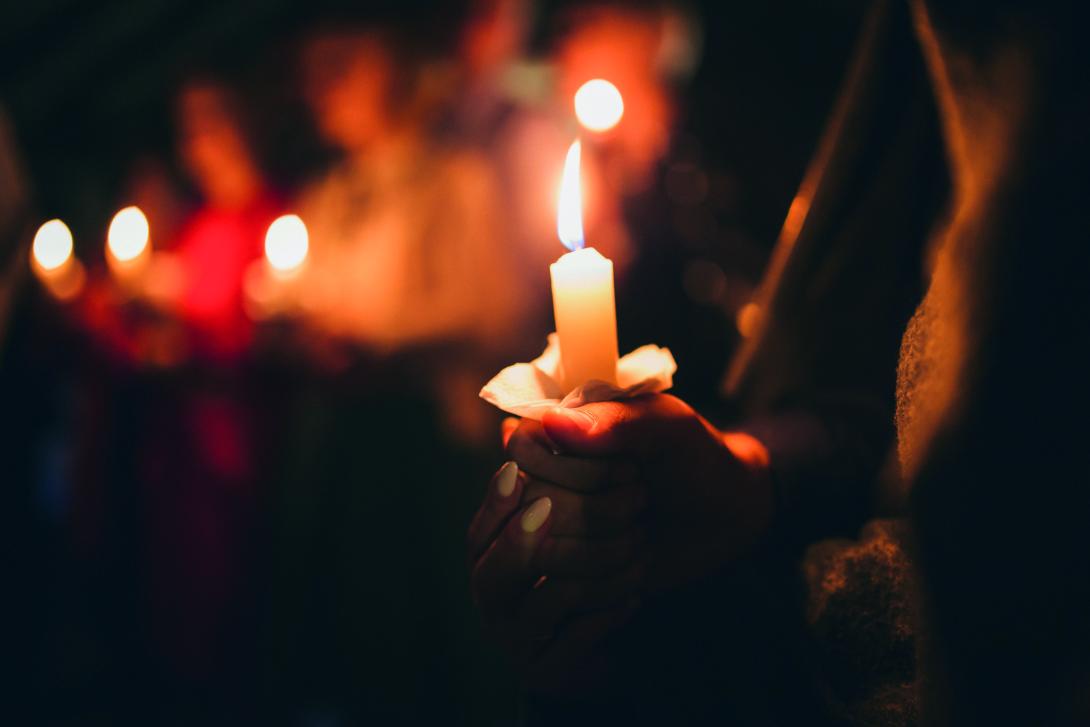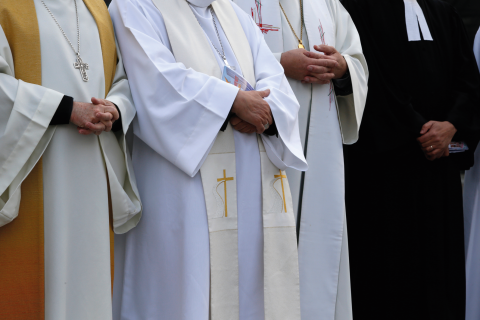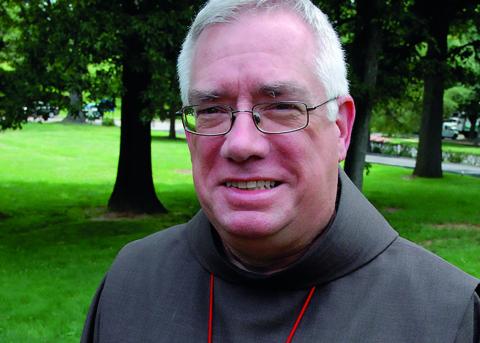An interview on how to get involved in dialogue with Karen Petersen Finch, author of Grassroots Ecumenism

Photo by stock.adobe.com
Why does ecumenism matter?
I think it matters because it is an obedience of love. Jesus wants us to be one. And ecumenism is making a decision in yourself that matches the decision that God has made that he wants us to be one. So that’s an obedience to the decision of God.
But it’s an obedience of love. We love God, so we want to do what he asks of us, but also out of love for each other, out of love of the Gospel and out of love of the world. In these times of polarization, we are seeking to go in the opposite direction, and that is so important.
Why do we need a “grassroots ecumenism,” meaning one where laypeople participate or take the lead?
For over 100 years, it’s always been assumed that representatives of the different denominations and traditions represent all of their people.
But the problem has been what we call reception, which is that the arguments carved out painstakingly between the theologians that were representing that people were not always communicated, and when communicated, they weren’t always received. It isn’t just a matter of hearing it or knowing, it’s their reception, when it becomes part of you.
In other words, what difference does it make that Lutheran theologians and Catholic theologians agree on the definition of justification by faith? Reception is when the layperson knows it, understands it, and their life in the parish is changed, because their life and the church has changed because of it.
That’s a tall order. But I think it is necessary! If that doesn’t happen, I don’t really know how ecumenism can continue to change the churches.
Faith is under attack, and, for a lot of people, it seems that they try to focus on their own congregation, trying to attract people. Ecumenism is questioned—do we really need it? What is your opinion on that?
The way you put it is very compelling. I think my experience in Clarkston, WA was that by coming together, we became more Christian than we were before. All of us went back into our churches with more passion, with more commitment, with more understanding. When the Holy Spirit is present, when dialogue is real, it makes you more yourself.
All around us, people are divided. People are mad at each other. And here we are in this little oasis of love, and it just gives us tremendous peace. I think that can be attractive, “By the way, you might want to come to our church because one of the things we do is we try to heal the divisions of centuries. We’re not about division. We’re about dialogue.”
Of course, it’s a great scandal to non-believers that Christians are so divided. And I think that should be a witness that we don’t just talk about love but try to live, with all of our folks.
I agree with you. And I think that
this mentality of thinking first of ourselves, and our community doesn’t help us to survive, because God sees all his children and all churches…
Yes, it’s like in Matthew 16:26, “For whoever wants to save their life will lose it, but whoever loses their life for me will find it.”
In dialogue with other Christians, we fear that we’ll lose ourselves, our traditions, which are so precious to us, but that is not what happens: nobody loses anything. Everyone gains this common sense of Christ, and that he was with us and that was just extraordinary.
You write in your book also about training local ecumenists. What does neighborhood Christian dialogue look like? What are possible effects and how can someone start ecumenical dialogue?
It is all about relationships. It started in Clarkston because the Catholic Church and the First Presbyterian Church wanted to do a Vacation Bible School together, and this school led to questions of doctrine.
Can we really share Christ together? They discovered topics where they were not quite on the same page, and that was when they reached out to me for help. So anyone can start by building those relationships, the relationships come before the dialogue.
And the dialogue serves relationships, not the other way around. I was just talking with a woman from a local Catholic Church here in Montreal who told me that she has a Bible study with an evangelical friend, and she described how they talk to each other and how they share and where they were respectful of their differences… There are people like this everywhere who are already involved in these relationships.
Then the trick is to get some education, get some possible structures, and that’s what my book is for: there are some examples of how certain topics were handled. Here are some activities that you can use when you’re talking about this particular subject.
There are so many materials out there, and lay people don’t realize that they are accessible. There are full internet collections.
So, for example, two churches who want to start an ecumenical dialogue, they can go online, and they can find previous agreements of their two denominations on the internet, and they can do what I call reception where they come together, read it and talk about it.
Sadly, everything gets politicized these days and those who work for Christian unity sometimes are marked as liberals, while those who are more conservative are those who want to evangelize and bring the faith to others. So, in your experience, is that true? And how can we overcome this thinking?
I addressed this in the introduction to the book, because it’s so important. For a long time, I was resistant to the World Council of Churches. I just thought, “oh, those liberals.”
But as it now stands, you find that the largest presence in the World Council of Churches is the Roman Catholic Church, which holds on to its own doctrinal positions, and yet also actively pursues dialogue. The other huge party at the World Council of Churches is the Orthodox community. They too, insist on holding on to the doctrinal pillars of their tradition.
Within the Protestant communities of the World Council of Churches, there has been a profound interest in what you might call “liberal,” for example, issues of justice. But there are ways to address those kinds of issues that are deeply biblical and deeply rooted in the first six centuries of our common tradition.
You could notice that in the New Testament, the word righteousness and the word justice are the same word, which implies that there wasn’t really a way to talk about what Christ has done for us without also talking about the kind of healing that he wants us to be making in the world. And it is true that there are issues on sexuality, sexual morality and anthropology, which are quite divisive, and the churches have to work really hard.
It’s an important topic because we should not be naive and think, “Well, we all believe the same, and we are the same,” because we have different traditions, but they don’t have to be a reason to be divided. There are reasons to think about our position and understand the why, and also sometimes we might discover that we are not that far from each other as we think.
So, is seeking Christian unity really opposed to the proclamation of the Gospel?
I used to fear that it would be a distraction from the very important work of telling the world that Jesus is Lord and Savior. But it isn’t at all, because he said that he prays for us to be one and the unity we want is for the purpose of his mission.
If it’s not for the purpose of mission, we should ask, why do we want this? Do we want this because we need to pull our resources together to survive? Or because it looks good in the media? There are so many things we humans do that we think are spiritual, but at the end, the only compelling reason to do that is when it’s love.
And we are having trouble telling the Gospel in a convincing way, when it’s obvious that Christians are divided. It’s one of the great resistances that people have: why should we accept your mission of love when you don’t love each other?
Very often the participants in ecumenical meetings are elderly. Are young people interested in ecumenism, too?
I just taught a course on ecumenism, and I admit, it was a very small class. But it was amazing that we were able to draw together any students at all for this course. Young people don’t know about ecumenism and if you explain to them, they kind of look like, “why should you worry about these little churches getting along? Nobody believes that anyway.”
What I learned is that there are two ways into ecumenism for young people. One of them is to think of it as a way of making peace in the world. And I say to them all the time, imagine what could be accomplished if the Christian traditions stuck together, and if they understood that as part of a larger human endeavor of peacemaking and reconciliation, which is desperately needed in our world. They are very interested in interreligious dialogue, too.
The second way in is through their own personal journey. I had a spectrum of belief in the room; I had students who were totally new to Christianity, and students who were preparing for ordination in their traditions.
The one place where they could all come together was their personal faith journey, because if you decide that you are for Jesus Christ, then you are for his people. If these people I’m talking about are deeply divided—do I want my people to be divided?
In the very first weeks of class, we read a book from the Taizé community, and we watched a film about this community. And the idea that young people don’t have an interest in unity is disproven there every single day. The students were so drawn to Taizé, and I think it involves both of those concepts: peacemaking, reconciliation and the question of who Jesus is to you.
What keeps you going in your work for ecumenism, what gets you energized when you think about the projects you’re involved in?
I think it’s the presence of the Holy Spirit that I feel in our local dialogues. It was clear that someone was helping us, and it changed people’s faces and their body language.
Everybody’s heart was so tender. There were a lot of teary eyes, a lot of gratitude. If the fruits of the Spirit are love, joy, peace, patience, kindness, goodness, faithfulness, gentleness and self-control, we were all growing in those fruits beyond our natural ability.
That is so hopeful. That’s what keeps me going.
If you enjoyed this article, you might like...














